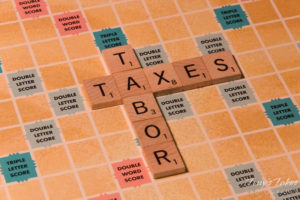The Colorado Supreme Court has issued another in a long string of rulings weakening the Taxpayer’s Bill of Rights — the part of the Colorado constitution called “TABOR.”

The voters adopted TABOR in 1992 to protect Colorado’s fiscal and economic health. TABOR guarantees the rights of citizens to vote on certain hikes in government spending, taxes, and debt. Unfortunately, each anti-TABOR court decision has become precedent for further anti-TABOR decisions. The Colorado courts are bootstrapping themselves toward ultimate destruction of Coloradans’ right to keep their state fiscally safe.
In TABOR Foundation v. Regional Transportation District, citizens argued that a law standardizing sales tax exemptions should have been presented to the voters. The citizens pointed out that the measure was not revenue-neutral. Rather, it was what TABOR calls a “tax revenue gain.”
Yet the justices ruled TABOR did not apply. They claimed the new law did not fit TABOR’s definition of a “new tax” or a “tax policy change directly causing a net tax revenue gain.” The court said the measure’s primary purpose was “to simplify tax collection and ease administrative burdens.” The court denied the measure was a “tax policy change,” and argued that it “only incidentally [increased] … tax revenues by a de minimis amount.” In describing the revenue gain as de minimis, the justices emphasized the percentage increase (0.6 percent) rather than the dollar amount ($3 million).
The tribunal also pointed to TABOR’s rule that TABOR be interpreted to “reasonably restrain most the growth of government.” The word “reasonably,” said the court, means that when interpreting TABOR, you have to be practical.
There were crucial flaws in the court’s reasoning.
First: The court was certainly wrong in denying that this change in tax base was a “tax policy change.” A change in tax base is, in fact, a classic example of a tax policy change. Unfortunately, this case is only one of several where judges averted their eyes while politicians manipulated Colorado’s tax base to extract more revenue without asking the voters. Other cases are discussed in my book on TABOR.
Second: The change unarguably increased tax levies. The amount is not important, because the wording of the state constitution contains no de minimis exception.
![]() Third: Everything in the history of how government treats taxpayers argues for preserving bright lines and for careful judicial review. Decisions that blur the lines virtually invite politicians to fudge the rules further. This particular holding will allow legislative bodies that first complicate the tax code with exemptions and loopholes then proceed to “simplify” in a way that extracts more cash.
Third: Everything in the history of how government treats taxpayers argues for preserving bright lines and for careful judicial review. Decisions that blur the lines virtually invite politicians to fudge the rules further. This particular holding will allow legislative bodies that first complicate the tax code with exemptions and loopholes then proceed to “simplify” in a way that extracts more cash.
Fourth: The court’s argument for “practical” interpretation was one-sided. There were several practical alternatives to violating the state constitution. For example, the drafters could have offset the revenue raised from the exemption changes by easing tax rates slightly. Or they could have adjusted exemption levels. Or — heaven forbid! — they could gone to the voters and asked for permission. Politically speaking, winning that permission probably would have been a slam-dunk.
Any of these approaches would have been more practical and socially-beneficial than employing sophistry to undercut the state constitution and weaken the rule of law.
Let’s give some credit, though: The court’s opinion had two good, although minor, features. First, the court abandoned its longstanding practice of refusing to call TABOR by its real name. Formerly, the justices usually insisted on employing the old ballot title instead (“Amendment 1”), presumably to avoid referring to TABOR as a “bill of rights.” (However, this latest opinion still did not get the name quite right — repeatedly omitting the apostrophe-and-s from the word “taxpayers.”)
The other good feature is that the justices signaled that they may be willing to ditch the ridiculous rule by which the government wins all TABOR cases unless citizens prove their argument “beyond a reasonable doubt.” This unfair rule directly violates the text of the state constitution.
Indeed, the imbalance of power between government and citizen — and the tendency of government to cheat when money is concerned — both suggest the government, not the citizen, should bear the burden of proof in cases like this.
Robert G. Natelson taught as a law professor at the University of Montana, and is now senior fellow in constitutional jurisprudence at the Independence Institute. He is the author of the book entitled The Colorado Taxpayer’s Bill of Rights (Independence Institute, 2016).


